The small subunit processome is required for cell cycle progression at G1
- PMID: 15356263
- PMCID: PMC524768
- DOI: 10.1091/mbc.e04-06-0515
The small subunit processome is required for cell cycle progression at G1
Abstract
Without ribosome biogenesis, translation of mRNA into protein ceases and cellular growth stops. We asked whether ribosome biogenesis is cell cycle regulated in the yeasts Saccharomyces cerevisiae and Schizosaccharomyces pombe, and we determined that it is not regulated in the same manner as in metazoan cells. We therefore turned our attention to cellular sensors that relay cell size information via ribosome biogenesis. Our results indicate that the small subunit (SSU) processome, a complex consisting of 40 proteins and the U3 small nucleolar RNA necessary for ribosome biogenesis, is not mitotically regulated. Furthermore, Nan1/Utp17, an SSU processome protein, does not provide a link between ribosome biogenesis and cell growth. However, when individual SSU processome proteins are depleted, cells arrest in the G1 phase of the cell cycle. This arrest was further supported by the lack of staining for proteins expressed in post-G1. Similarly, synchronized cells depleted of SSU processome proteins did not enter G2. This suggests that when ribosomes are no longer made, the cells stall in the G1. Therefore, yeast cells must grow to a critical size, which is dependent upon having a sufficient number of ribosomes during the G1 phase of the cell cycle, before cell division can occur.
Figures
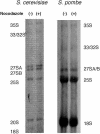
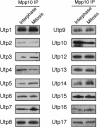

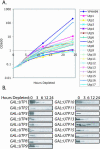
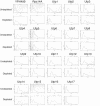

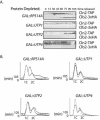
References
-
- Buscemi, G., Saracino, F., Masnada, D., Carbone, M.L. (2000). The Saccharomyces cerevisiae SDA1 gene is required for actin cytoskeleton organization and cell cycle progression. J. Cell Sci. 113, 1199-1211. - PubMed
-
- David-Pfeuty, T., Nouvian-Dooghe, Y., Sirri, V., Roussel, P., and Hernandez-Verdun, D. (2001). Common and reversible regulation of wild-type p53 function and of ribosomal biogenesis by protein kinases in human cells. Oncogene 20, 5951-5963. - PubMed
-
- Du, Y.C., and Stillman, B. (2002). Yph1p, an ORC-interacting protein: potential links between cell proliferation control, DNA replication, and ribosome biogenesis. Cell 109, 835-848. - PubMed
Publication types
MeSH terms
Substances
Grants and funding
LinkOut - more resources
Full Text Sources
Molecular Biology Databases

